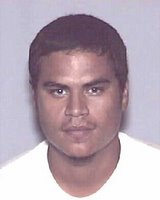Judge Orders Padilla's Shackles Removed
 U.S. officials who want terror suspect Jose Padilla to wear handcuffs and ankle chains during open court appearances must first show he poses a direct safety threat, a federal judge said Friday.
U.S. officials who want terror suspect Jose Padilla to wear handcuffs and ankle chains during open court appearances must first show he poses a direct safety threat, a federal judge said Friday.U.S. District Judge Marcia Cooke made the statement after Padilla appeared in the shackles for his first appearance before her since his transfer in January from military custody as an alleged al-Qaida "enemy combatant" to a criminal defendant. "At some point in time, people have to be able to write, take notes," Cooke said. "No handcuffs in court, please."
Padilla and four others are charged with conspiracy and providing material support to terrorists for allegedly operating a North American cell providing finances, recruits and supplies.
The handcuff exchange underscored the difference for Padilla between his 3 1/2 years in U.S. military custody and the due process protections afforded by the justice system. The case is scheduled to go to trial in early September and could take about six months.
Only Padilla and co-defendant Adham Amin Hassoun were in court for Friday's status hearing, and both wore handcuffs attached to a waist chain as well as ankle chains, something Hassoun had not done in previous hearings.
Cooke asked prosecutors for an explanation, saying the defendants have "always been respectful, polite and courteous." The prosecutors cited Marshals Service policy. Hassoun's lawyer, Kenneth Swartz, said he was told the shackles were ordered because of Padilla's high profile.
President Bush designated Padilla as an "enemy combatant" in June 2002, a month after he was arrested at Chicago's O'Hare International Airport on allegations that he was on an al-Qaida terrorist mission. The government dropped that designation in November, leading to a grand jury indictment on criminal charges.
The Supreme Court is considering whether to take up Padilla's case arising from that long military detention, which would test whether a U.S. president may order unlimited detention without trial during wartime for U.S. citizens.
Source : Here


0 Comments:
Post a Comment
<< Home